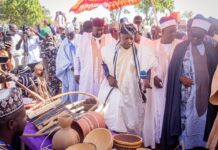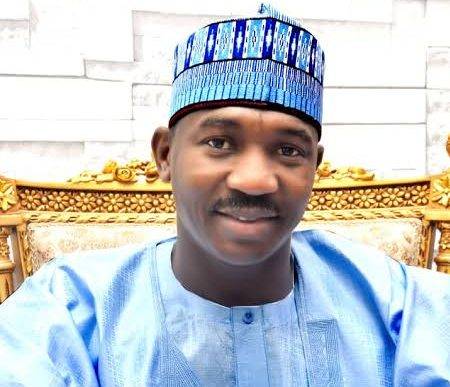By Adagbo ONOJA
It certainly would be the longest, the largest, the most volatile, most diverse and most productive in the series of activities leading up to the burial of the many sided Comrade Emma Ezeazu who died on May 18th, 2015. The colloquium in his honour at Abuja June 29th, 2015 brought back on the table the story of the epic struggle for power between radical student nationalism and military dictatorship in the mid eighties, a struggle in which Ezeazu was one of the heroes. The session did not lack the funny and the solemn, the mellowed and the defiant, the lamentation and the celebrative, the fundamental and the trivia. Or regrets, confessions, reprimands, calls for renewal, challenge throwing and lesson learning as activists straddling the NGOs, academia, business, politics, labour, the professions and what have you came to reflect on “Emma Ezeazu: Students and Popular Democratic Struggle in Nigeria” at the Auditorium of the Nigeria Labour Congress, (NLC), Abuja.
Comrade John Odah, former General Secretary of the NLC, opened the floodgate in a welcome speech on behalf of the Emma Ezeazu Memorial Committee in which he revealed how Ezeazu ended up being the longest serving president of NANS. It was not because of any personal ‘longer throat’ for longevity in office, the disease of power in Africa but because Ezeazu’s tenure turned out one of the toughest in the epic battles which pitched students and their organic networks in the larger society against military dictatorship. It was during Ezeazu’s tenure, for example, that violent cultists and cultism sprang up on campuses. It turned out not to be cultism as such but toughies groomed and unleashed on selected campuses by the government aimed at undermining radical student activism.
Ezeazu did not only survive and transcend that challenge, he moved on to be a many sided operator: permanent ally of Nigerian workers, human rights campaigner, pro-democracy activist to community rights agitator, (with particular reference to the campaign for social inclusion of the original inhabitants of Abuja). For Odah, these were the evidences that Ezeazu lived a life of commitment.
Asisi Asobie, Professor of Political Science and one of the ‘radicals teaching what they were not paid to teach’ at the University of Nigeria, Nsukka, (UNN) in those days and who chaired this occasion took the floor to continue the story. As a UNN insider and a patron of the radical stream, he knew Ezeazu very well although he only learnt about his death at the point when Odah was inviting him to chair the occasion.
Asobie recalled how Ezeazu, along with Chima Ubani, then president of the UNN Students Union masterfully rubbished a traitor’s account to the Abisoye Panel in 1986. The traitor who was claiming the authority of the insider, had falsely testified to the panel how Ezeazu and Ubani planned to burn the Police post at UNN. The duo, however, turned the table against him in a counter-narrative which Asobie believes redefined the UNN in line with what he said another student, Olu Oguibe, had inaugurated years earlier.
As the best graduating student of the university in the year UNN clocked 25 years, Oguibe was to perform one of the rituals – deliver a valediction at an anniversary IBB was attending as the Head of State. Fearful of students, the Registrar asked for and got an advance copy of the valediction text from Oguibe to make sure its content suited power and authority. Then Oguibe executed a one man coup – he brought out a different script from his pocket when the time came. Stung by the drama unfolding before his eyes and ears, the Registrar got up from his seat in an attempt to stop Oguibe. It was a mission impossible. The crowd roared in anger. He retreated. Oguibe continued and finished reading his speech. To make it impossible for security agents to grab him, the students instantly formed a human shield around him and escorted him to safety.
Of course, the university was queried for embarrassing the Head of State, a query the university council took too seriously until Abba Dabo, a member of the council from Kano wondered why that should be so. If there had been no Oguibe, he told the council, it would have been difficult to believe that UNN was celebrating 25 years of existence. It was then everyone regained his breadth and relaxed. What Asobie did not add is that Abba Dabo had been the president of the Ahmadu Bello Student Union government several years back and government appointment had not estranged him from that universe of reasoning.
Asobie’s regret is the way the culture of intellectual rigour, ideological clarity and social commitment have all died across Nigerian universities today, giving way to what everyone could see is utter anarchy. “But we are celebrating , not mourning Ezeazu”, he said, adding that Ezeazu’s case is where the Igbo name, Asobieronu- stop fearing death and do what you have to do as opposed to Onwubiko – let’s beg death to leave us, would apply.
Clement Nwankwo, a co-founder of the Civil Liberties Organisation, (CLO) and Ezeazu’s predecessor spoke of how Ezeazu radicalized the CLO. Instead of relying on the courts, Ezeazu devised street actions. In a system whose operators do not respect court judgments, that strategy is what led to what we have today as democracy, he said in an retrospective verdict. Ogaga Ifowodo, the US based poet who spoke later was happy about that testimony coming from Nwankwo himself because it could look like denying the founders of the CLO their achievement if someone else claimed that achievement for Ezeazu.
Lanre Arogundade, the President of NANS who signed the watershed alliance between NANS and the NLC in 1986 spoke next, posing the contextual issue in the collapse of NANS and radical nationalism. His analysis is that leadership in NANS was never about the hero but about the collective. It was movement thinking coming alive, he said, pointing out how the radical environment across the country provided the added context. “I doubt if the NANS of that era could have been if the NLC itself were what it was recently”, a claim he said warrants taking the ‘objective conditions’ into consideration in defining and pushing for change.
Femi Ahmed, a deliberate student activist for a decade but now a pastor revealed how Ezeazu joined the Marxist Movement at UNN and remained in it unlike other students who would migrate immediately they either lost an election or saw no chance of making it politically on campus. Femi who used to be called ‘Sandinista’ also revealed a side of Ezeazu: his being a goal keeper of note, doing so for Mbanefo Hall at UNN in those days.
For Jaiye Gaskiya, the challenge of Ezeazu’s demise is the challenge of unity but unity around a “defined cause that makes unity possible”. For Mallam Y.Z. Yau, Executive Director of the Kano based Centre for Information Technology and Development, (CITAD) and one of the masterminds of that age, collapse of education is the single most important source of self-serving, self-centred and mercenary elite that have taken over Nigeria today. Olajengbesi Pelumi, a NANS activist of this generation from the University of Abuja did not think it is the student activists but the society of today – the decay in infrastructure, quality of academe and the morass in the society – that should take the blame for the catastrophe that has befallen radical nationalism.
Chukwunwike Ezeazu, a pastor and older brother of Emma Ezeazu who represented the family described the entire proceedings as an eye-opener for him. We have to mourn but we have to move forward, he said in apparent reference to Ogaga Ifowodo’s point that mourning has its own functional essence, although not the same thing as submitting to being taken hostage by sentiment. The senior Ezeazu told the story of how people used to ask in low tones whether he too was also a radical like Emma. That was when he was an accountant at UNN. But he said he and, indeed, the family were radicals because each time Emma was arrested and detained, they got involved – trying to do something, worrying about his safety and so on. Describing his junior brother as fearless, he wondered how he even lasted this long.
At the end of the day, NLC President, Ayuba Waba was delighted about the way everything went. He has personally taken note of every point made, he said, especially about need for reconciliation in the NLC, including Asisi Asobie’s point that reconciliation did not mean forgetting about the truth. It must be a wind of change that the NLC President sat throughout the session. It was then the turn of Auwal Musa Rafsanjani who lived and worked longest with Ezeazu in Abuja to thank everyone for a great day. For him, Emma Ezeazu is dead but not dead. So, God helps Nigeria!



